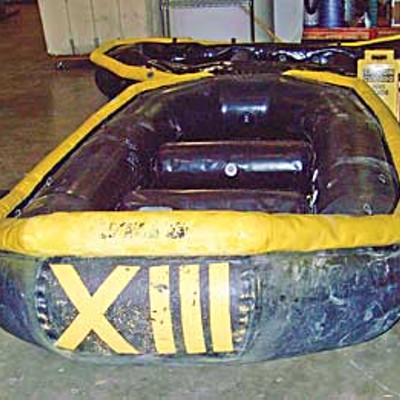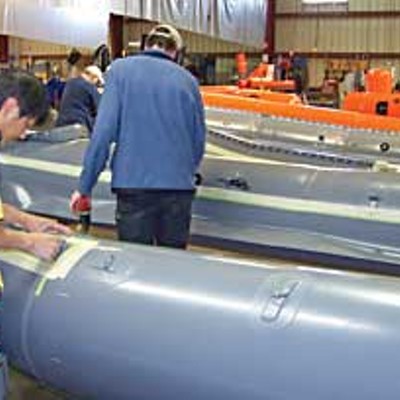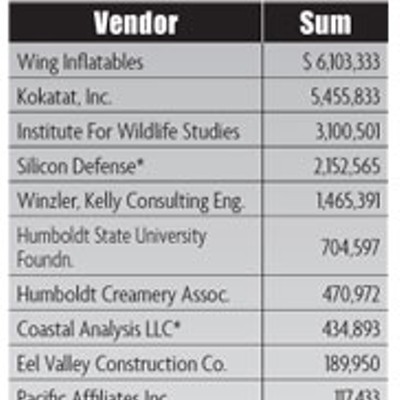Humboldt At War
Local military contractors feed and clothe soldiers, keep birds and bats safe
By Hank Sims[
{
"name": "Top Stories Video Pair",
"insertPoint": "7",
"component": "17087298",
"parentWrapperClass": "fdn-ads-inline-content-block",
"requiredCountToDisplay": "1"
}
]
This Thursday, March 20, marks the five-year anniversary of the invasion of Iraq. In Humboldt County, the occasion will be marked, this Saturday at 1 p.m., by the county's annual peace march, which will start at the Eureka Municipal Auditorium.
As always, the peace marchers will bring all sorts of issues to the event. Some will push for the impeachment of President George Bush. Some will demand an investigation to look at American culpability in the terrorist attacks of Sept. 11, 2001. Some will advocate the presidential candidacy of Barack Obama, or Hillary Clinton, or Ralph Nader. But one thing that will likely unite them is a disdain for what Dwight D. Eisenhower called "the military-industrial complex."
The United States of America has now spent upwards $500 billion on the war and subsequent occupation of Iraq. In the same time (since government fiscal year 2002-2003) the U.S. Department of Defense has spent almost $1.5 trillion on contracts with private companies — not all of it directly related to the war, but all of it required to maintain the Pentagon and the branches of the service in one way or another. That figure — $1.5 trillion — is taken from USAspending.gov, the government's online data clearinghouse on federal spending. The site also shows that $20 million has been spent with contractors based in Humboldt County. It's a pittance by national standards, but for some local businesses and researchers it's made all the difference.
There's a few conclusions that can be drawn by looking at the list of 24 Humboldt County companies and other contractors that have done business with the military since 2000. For one, it shows that Humboldt County's principal value to the federal government lies principally in its relationship with the outdoors. The vast majority of money the military spends here goes to one of two business sectors: consultants with specialties in the ecological sciences and firms that got their start by catering to outdoor enthusiasts. If military spending is any guide — and it's probably as good a guide as any — our niche in the world economy stems from our relationship with the natural world.
The other thing that the list makes obvious is that that niche is overwhelmingly dominated by the county's second city. Over three-quarters of the military contracts that go to Humboldt County go to Arcata. A portion of this is due to the scientific community centered around Humboldt State University. (Humboldt State itself has done over $700,000 worth of business with the Dept. of Defense, which helps fund research and development through the university's Sponsored Programs Foundation.) But by far the larger part goes to Arcata's vibrant manufacturing scene, which has supplied branches of the Pentagon with boats, clothing, refrigerators, furniture and musical instruments.
At the same time, of course, Arcata is also the spiritual home of the local antiwar movement, at times making national headlines for the anti-Bush, anti-military items that have popped up on its City Council agenda. But the contradiction is not as great as it might seem. In the first place, by national standards military spending in the city is miniscule. In fiscal year 2006 (September 2005 through August 2006), the Dept. of Defense spent almost $300 billion on contracts — just about $1,000 for every resident of the United States. Meanwhile, it spent only $1.48 million in Arcata, or about $86 per resident.
Then also, the closest thing to weaponry produced by Humboldt County are sailors' dry suits and inflatable boat sponsons. The rest of the work being done by Humboldt County businesses for the Pentagon is only very remotely connected to the war, if at all. Rather, it's the kind of work that any sort of massive bureaucracy might require to sustain itself.
Just two Arcata manufacturers make up more than half of the business that Humboldt County has done with the military: Wing Inflatables and Kokatat. The two firms got their start together in the 1970s. Back then, Wing was "The Electric Rafting Company," an early whitewater rafting guide; Kokatat was "Blue Puma" and made down sleeping bags and jackets. The two companies grew up together at a time when Arcata entrepreneurship was flourishing. They worked together on occasion: Bill Wing, founder of Wing Inflatables, said last week that he used to take Kokatat's early crew out on rafting trips.
Both companies have since shifted focus, and both are much larger. Each of them has a national presence. And they work together more closely than ever — especially seeing as how they share some significant customers in the U.S. Navy and the Coast Guard.
"A lot of times when people come to Humboldt County to see us, they go right over to Kokatat and see them," Wing said.
The Wing Inflatables company got its start in the 1980s, when Electric Rafting couldn't find a boat suitable for coastal trips along the Lost Coast. Wing decided to make the boat himself, and he and his company quickly found they were very good at it. Soon after, Wing said, the Navy SEALs lost some people on a mission that involved rafting down whitewater, and they approached Electric Rafting for training. These contacts eventually blossomed into a boat-building contract.
Today, Wing occupies two large warehouses on Samoa Boulevard filled with high-tech machinery, raw polyurethane fabric and boats in various stages of assembly. The company has come a long way from its roots building rafts for paddlers. Wing estimated that about 3 percent of his business is for recreationalists. Nowadays, it's mostly for industry and governmental agencies — not only the Navy and Special Ops forces but the Coast Guard (which falls under the Dept. of Homeland Security, not Defense), the Dept. of the Interior and foreign governments that have a trading relationship with the United States. It employs 50 people, and it makes all sorts of stuff — mostly inflatable rafts and "sponsons," which are like bumpers for boats.
"We're not making bullets, we're not making land mines," Wing said. "We're building things that keep people safe."
Across town at Kokatat's headquarters in the Alder Grove Industrial Park, founder Steve O'Meara saw a lot of similarity between his company's and Wing's. To survive and thrive in Humboldt County, he said, small manufacturers have to focus on quality. "You have to want to live here, and you have to have a high-value-added product," he said.
Kokatat's first niche, back when it was still called "Blue Puma," was being one of the first clothing manufacturers in the world to really adopt to Gore-Tex — the waterproof, breathable fabric pioneered in the 1970s. Gore-Tex's special properties changed the industry, and the company took off from there.
Kokatat today makes all sorts of stuff for wet conditions — jackets, pants, life vests — but O'Meara said that most of the military work was in "dry suits" for sailors.
Kokatat is mostly thought of as a company for granola-type outdoorsy folks, but O'Meara said his company isn't the only one in his product category making stuff for the armed forces. Why? "Most of the outdoor industry makes stuff for the military," O'Meara said, "because they make the best stuff." He said there was some discussion about this among the industry when the Irac War was looming — whether or not manufacturing products that would be used in war was a good idea, public relations-wise — but in the end most agreed that it was OK.
"Personally, I feel that the US needs a military," he said. "The people that we make these products for are basically young kids."
For most of the other businesses on the list of Humboldt County military suppliers, their sales to the defense department represented small one-off sales of items that are usually aimed directly at the consumer. In 2004, Carlson Wireless sold $48,524 worth of its communications equipment to the Army. (At the time, the company was based in Redway; it has since moved to Arcata.) A year later, Sun Frost, an Arcata-based manufacturer of energy-efficient refrigerators, sold a fridge to the Air Force. Marimba One has sold its high-quality instruments to both the Army and the Navy.
Len Mayer, chief operating officer of the Humboldt Creamery, said last week that he didn't even realize the company had done business with the military, despite having sold almost half a million dollars worth of product to the Defense Commissary Agency within the last couple of years. Mayer said that the Creamery, a cooperative representing most of Humboldt County's dairy farmers, did a good deal of its business through independent brokers, and the cooperative wasn't always aware where its products ended up being consumed.
"You're talking significantly less than one percent of the business we do," Mayer said. Only one of the contracts in the federal database had specific details; it showed that the Commissary Agency bought $836 worth of ice cream in March 2007. Mayer was unable to provide any additional details.
Other businesses have a much closer relationship with their customers. Wallace & Hinz, a manufacturer of high-quality wooden bar cabinets that last year moved from Arcata to Blue Lake, shows up only once in the database of federal contracts — it built a bar for an officers' club at an Air Force base in Spain. But Wallace & Hinz sales director Mark Coates estimated that, in fact, military work accounts for about 20 percent of the company's business, and said that the figure was growing. (It's likely that the bulk of the work the company does does not appear in the database because it's not undertaken directly through the Dept. of Defense.)
"They're a good client for us," Coates said. "They keep coming back. We've done them in Europe, in Asia ... we did one in Iceland." Coates said that Wallace & Hinz does more than just ship its bars to bases. The company often travels to the site to assess the base's recreational facilities, and then provides not only the bar but any needed accessories.
Alan Fox, the Fortuna-based proprietor of Fox Weather, LLC, provides his site-specific detailed weather forecasts to any number of clients all over the West Coast — agricultural interests, timber managers, municipal governments. But one mainstay is the Army Corps of Engineers, which is funded through the Dept. of Defense. The Corps' Los Angeles office needs to keep close tabs on anticipated rainfall, Fox said, so as to know what's going to be hitting the Los Angeles metropolitan area's intricate water infrastructure.
The U.S. military is one of the largest landowners in the United States, and when it comes to managing that land it must follow environmental laws like anyone else. So its not surprising that Humboldt County, with its vast array of environmental consulting and engineering firms, gets some of that business.
The firm with the largest military contracts is the Institute for Wildlife Studies, located just down the road from Kokatat in Arcata. All told, the firm, which has satellite offices in San Diego and on Santa Catalina Island, has done $3.1 million worth of consulting work for the military since 2000, most of it dealing with the fragile ecosystems of the Channel Islands. The U.S Navy owns the southernmost island in the chain — San Clemente Island — and it operates an air base and weapons testing facility there.
Dick Johnson, the Institute's Arcata-based operations manager, said that the bulk of the firm's work with the Navy has to do with monitoring the endangered San Clemente sage sparrow.
"We're pretty liberal here," Johnson said. "In our case, it's pretty much a situation where our goal is to foster these animals. In addition to the sage sparrow, we deal with foxes on all the islands. Whatever it takes to make that happen — to make those species thrive and survive wherever they are."
But in addition to managing direct issues on its lands, the Dept. of Defense also funds proactive wildlife management research. Through a joint agency that includes the Environmental Protection Agency and the Dept. of Energy, the Pentagon has awarded a several-year contract (totaling about $700,000) to Humboldt State University biology professor Joe Szewczak, whose principal area of research is with bats.
For the last 12 years, Szewczak has been working to develop a new, non-invasive methodology for the detection and monitoring of bird and bat populations. Since getting the recent contract, his work has taken off, he said; developing the methodology requires extensive field work around the United States, and he hadn't before had sufficient means to do the work.
Szewczak said that his work will directly lead to better management of winged species found on military lands. More than that, though, it will be a tool that will be available to wildlife biologists everywhere.
"It's just a good thing that the Dept. of Defense actually has the funds to sponsor this technology we're developing, because most all the other federal agencies don't have the funds to do it," he said.
The extent of the military's business relationships in Humboldt County isn't widely known, but peace activists — at least the ones contacted for this story — weren't very concerned about it.
Dave Meserve, a former member of the Arcata City Council known for the many symbolic resolutions he sponsored protesting the war and the Bush administration, is currently working to put two local initiatives on the ballot that would ban military recruiting efforts targeting minors in Eureka and Arcata. For years he has worked to promote the idea that local action can influence the course of national events. Still, he said, he drew a sharp distinction between local firms that provide support to military personnel and large firms that more actively engage in the production of materiel.
"It isn't as if we're anti-military," Meserve said. "We're against weapons production, and particularly nuclear weapons production, but I can't say I'm against anything that would make GIs safer or warmer."
Becky Leuning, a well-known Arcata activist, won't be able to be at this weekend's peace march; she'll be in Vietnam, working with the Friendship Village Project, which seeks to heal the scars from that war by bringing together veterans from both sides to build housing and clinics for people in need. Leuning said that her father worked for a defense contractor all his life, and that she had no desire to pass judgment on people doing business with the military. The problem wasn't with any individual or company, Leuning said; rather, it's with our priorities as a society.
"I think it's important that people look at the economics of militarism, and really push for some kind of transition to a peace-based economy," Luening said. "As long as our economy is based on war, then we'll have wars forever. So we have to look at the big picture and how to make that transition."
In the meantime, people make a living. They milk cows, build things, conduct scientific research. The local economy may not be dependent on the Pentagon budget, or even close to it, but people in business are aware that there is money to be made with the federal government. Jacqueline Debets, the County of Humboldt's economic development coordinator, said Monday that the local Small Business Development Center, with which she shares office space, has recently sponsored some workshops on applying and competing for federal contracts.
"There's obviously more potential, so maybe we should keep running those kinds of seminars," Debets said. "Maybe we'll get back some of that $26,000 per family we spent on this war."
more from the author
-
Cache Flow Problems
Malfunction at cable Internet provider leads to stale Web pages, private information exposed
- Feb 3, 2011
-
Hot Seats
As the general plan update finish line looms nearer, upheaval over planning commission membership
- Jan 27, 2011
-
Is Everybody HAPPY?
- Jan 20, 2011
- More »
Latest in News
Readers also liked…
-
Through Mark Larson's Lens
A local photographer's favorite images of 2022 in Humboldt
- Jan 5, 2023
-
'To Celebrate Our Sovereignty'
Yurok Tribe to host gathering honoring 'ultimate river warrior' on the anniversary of the U.S. Supreme Court ruling that changed everything
- Jun 8, 2023









































